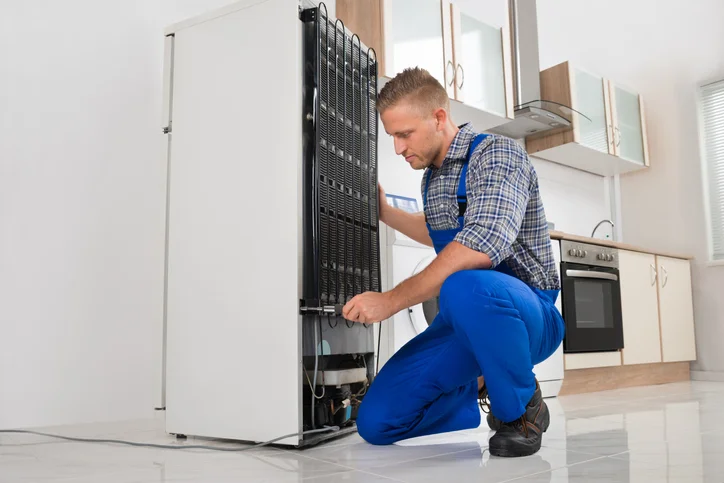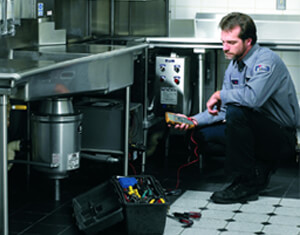Troubleshooting Tips from Refrigerator repair experts Dependable Refrigeration & Appliance Repair You Can Try Today
Troubleshooting Tips from Refrigerator repair experts Dependable Refrigeration & Appliance Repair You Can Try Today
Blog Article
Crucial Tips for Effective Ref Repair to Extend Home Appliance Life Expectancy
When it comes to your refrigerator, appropriate repair work and maintenance are crucial for durability. Recognizing usual problems and knowing when to act can make all the distinction.
Recognizing Usual Refrigerator Problems
Refrigerators are necessary in keeping your food fresh, but they can come across a variety of common troubles that disrupt their efficiency. One regular problem is inadequate air conditioning. If you discover food ruining quicker than common, examine the thermostat setups or think about if the door seals are damaged. One more typical problem is excessive sound, which can suggest a malfunctioning compressor or a failing follower. You might also experience water merging inside or underneath the fridge; this typically results from a stopped up defrost drain or a faulty water line. Additionally, if your refrigerator's light isn't functioning, maybe a straightforward bulb problem or a problem with the door button. Ice build-up in the freezer can hinder air movement and cooling performance. Identifying these issues early can conserve you money and time in repairs, guaranteeing your refrigerator runs efficiently and efficiently.
Normal Maintenance Practices
To keep your appliances running efficiently, you need to remain on top of regular maintenance methods. Clean the condenser coils, check the door seals, and keep track of the temperature setups to guarantee peak efficiency. These easy jobs can conserve you money and time on fixings down the line.
Tidy Condenser Coils Consistently
Cleaning your condenser coils regularly can considerably boost your appliance's efficiency. Dust and dirt build up on these coils in time, causing your device to work harder and eat even more energy. To maintain them clean, disconnect your device and carefully remove any kind of safety covers. Make use of a vacuum cleaner with a brush add-on or a soft brush to carefully eliminate particles. If required, a mixture of cozy water and mild detergent can help get rid of persistent crud. See to it to allow everything completely dry totally before reassembling and connecting the home appliance back in. Aim to cleanse your coils at the very least twice a year, or more frequently if you have animals or stay in a dirty environment. This straightforward task can extend the life-span of your home appliance considerably.
Check Door Seals
Three basic actions can help you ensure your appliance's door seals are in great condition. Second, clean the seals utilizing cozy, soapy water to eliminate any kind of debris or grime. By complying with these steps, you'll keep your home appliance's performance and longevity, saving you cash on power costs and repairs in the long run.
Screen Temperature Level Setups
Routinely checking your device's temperature setups is necessary for finest efficiency and effectiveness. Whether you're handling a refrigerator, fridge freezer, or stove, watching on these settings can protect against lots of issues. For refrigerators, go for temperatures between 35 ° F and 38 ° F; for freezers, linger 0 ° F. If the temperature levels are too expensive or low, your appliance may function harder, throwing away energy and shortening its lifespan. Use a thermometer to check these setups frequently, especially after major changes, like moving your home appliance or changing the thermostat. If you observe changes, adjust the settings accordingly and seek advice from the customer handbook for assistance. By staying aggressive regarding temperature level monitoring, you'll assure your devices run smoothly and last much longer.
Repairing Air Conditioning Issues
When your refrigerator isn't cooling down effectively, it can result in spoiled food and threw away cash, so resolving the problem immediately is crucial. Beginning by inspecting the temperature level settings to verify they're at the advised degrees, usually around 37 ° F for the refrigerator and 0 ° F for the fridge freezer. If the settings are appropriate, check the door seals for any spaces or damages; a malfunctioning seal can allow cozy air to go into.
Examine the condenser coils, typically located at the back or base of the unit. Clean them with a vacuum cleaner or brush to optimize performance. If problems linger, it might be time to call a professional.
Repairing Water Leakage and Ice Build-Up
If you're dealing with water leakage or ice build-up in your appliance, it's important to recognize the resource of the issue. By identifying where the water is coming from, you can prevent further problems and prevent expensive repair services. Allow's discover some efficient strategies to deal with these usual problems.
Recognize Leak Sources
How can you efficiently determine the sources of water leakage and ice accumulation in your home appliances? Beginning by examining the seals and gaskets on your refrigerator and fridge freezer doors. A worn or broken seal can allow warm air to enter, triggering condensation and ice. Next off, examine the drainpipe pan and drain system for blockages or blockages; a backed-up drain can bring about water merging. Try to find any loose connections in the water system line, which can produce leaks. Also, examine the Visit Website defrost drainpipe for ice build-up, which could disrupt appropriate water drainage. By systematically examining these locations, you'll pinpoint the source of the problem, permitting you to take the needed actions to repair it and expand your appliance's life expectancy.
Protect Against Ice Development
To avoid ice development in your appliances, beginning by confirming the temperature level setups are appropriate. If your fridge or fridge freezer is too cold, it can lead to too much ice build-up. Inspect the door seals consistently; damaged seals can let warm air in, causing condensation and ice development.
Keep the home appliance well-ventilated and stay clear of overcrowding, as this can block air flow - Appliance Repair Oro Valley Dependable Appliance Services. Likewise, consistently thaw your fridge freezer if home appliance repair it does not have an automated defrost function.
If you see water leak, determine and repair any kind of blocked water drainage holes, as they can add to ice buildup. Lastly, clean the coils and verify they're functioning properly to maintain peak efficiency. Taking these steps will certainly aid extend your home appliance's life-span and performance.
Dealing With Noisy Fridge Seems
While it may seem disconcerting, a loud refrigerator usually indicates minor issues rather than significant breakdowns. Typical perpetrators include the compressor, followers, and water lines.
Next, inspect for loose things inside. Often, containers or shelves can rattle, developing unwanted noise. Tighten up or rearrange them to eliminate the audios.
If you notice a clicking sound, it could be the defrost timer. This is normally safe but might indicate it needs assessment.
Finally, confirm your fridge is level. An unbalanced home appliance can generate resonances and noise. Utilize a degree to inspect, and readjust the feet if needed. Attending to these concerns promptly can aid preserve your fridge's efficiency and prolong its lifespan.
When to Replace Parts vs. Full Replacement

Nevertheless, if your home appliance is older and experiencing numerous issues, a complete substitute might be extra cost-efficient. Consider the cost of repairs versus the appliance's worth. If repairs exceed 50% of a brand-new device's rate, basics it's typically better to purchase a substitute. Furthermore, if you observe ongoing troubles that keep reoccuring, it's an indication that your device has actually reached the end of its life. Weigh these elements meticulously to make the ideal choice for your needs and budget.
Understanding When to Call a Specialist
Just how can you tell when it's time to call in an expert for home appliance fixing? If your device stops working entirely or often trips circuit breakers, it's another red flag.
You need to likewise consider your very own comfort level with repair work. If you're unsure concerning identifying the problem or do not have the right devices, it's ideal to connect for assistance. Keep in mind, trying challenging repair work can cause more damage or perhaps safety and security dangers.

Frequently Asked Concerns
Exactly how Commonly Should I Tidy the Refrigerator Coils?
You should cleanse your fridge coils every six months. This assists preserve performance and prevents getting too hot. If you notice excessive dirt or pet hair, tidy them a lot more regularly to ensure your fridge runs smoothly.

Can I Make Use Of Vinegar for Cleansing My Fridge?
Yes, you can make use of vinegar to clean your fridge! It's an outstanding natural cleaner that removes smells and spots. Best Appliance Repair Near You Dependable Refrigeration & Appliance Repair Service. Just mix it with water, apply it to surface areas, and clean down for a fresh, tidy fridge
What Temperature level Should My Fridge Be Set To?
You should set your fridge to 37 ° F(3 ° C) for suitable food conservation. This temperature maintains your food fresh while preventing putridity, ensuring your groceries last much longer and reducing waste. It's a simple modification you can make!
Does a Fridge Required to Be Leveled?
Yes, your refrigerator needs to be leveled. If it's irregular, it can influence cooling effectiveness and cause excess noise. Check the progressing legs and change them to guarantee proper balance for ideal efficiency.
Just How Can I Lower Refrigerator Energy Intake?
To minimize your fridge's energy consumption, keep it tidy and well-ventilated, check door seals for leaks, established the temperature in between 35-38 ° F, and stay clear of overwhelming it. These steps can significantly lower your power expenses.
Report this page